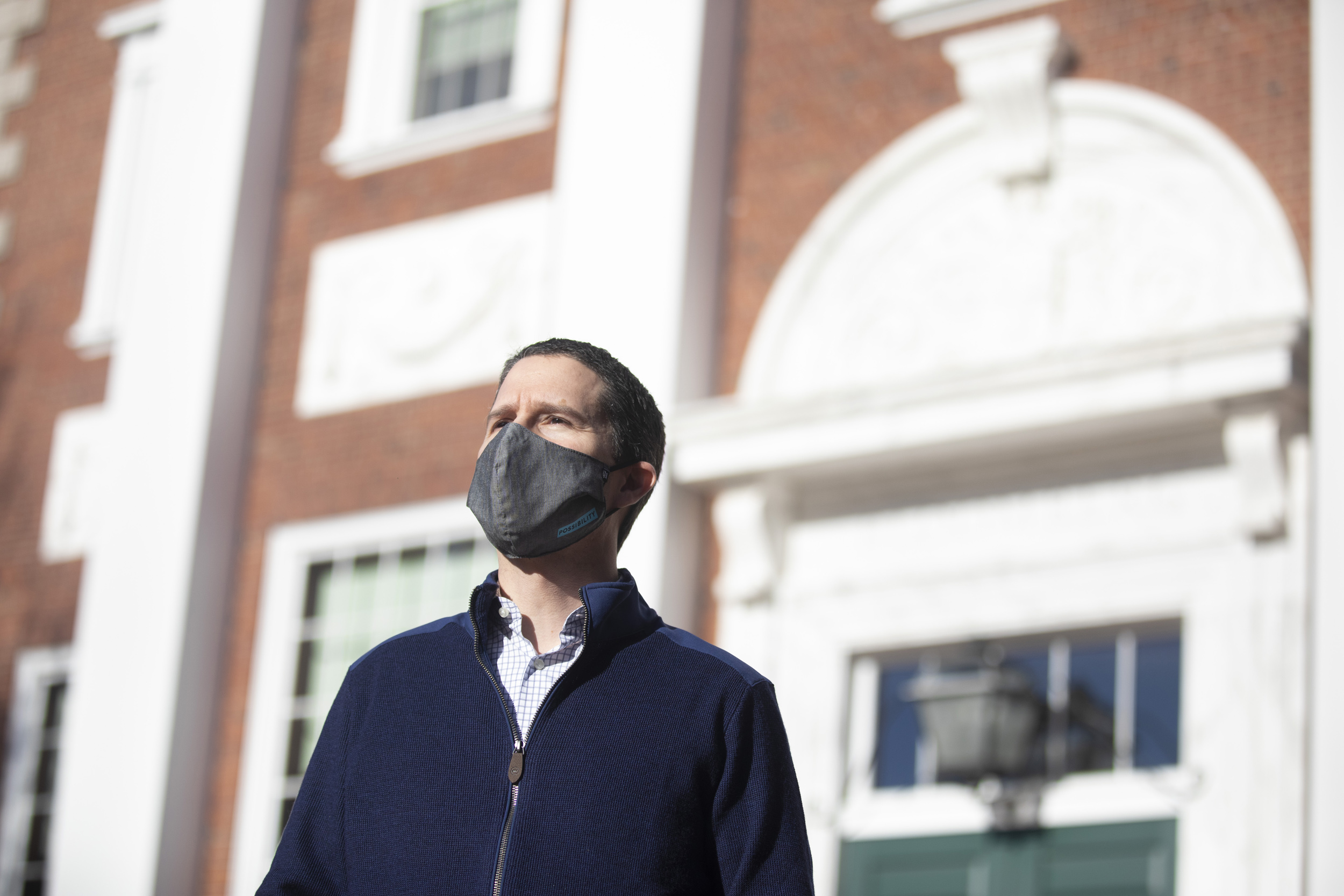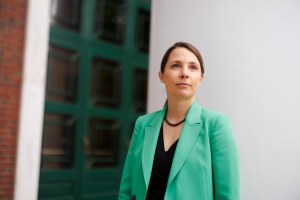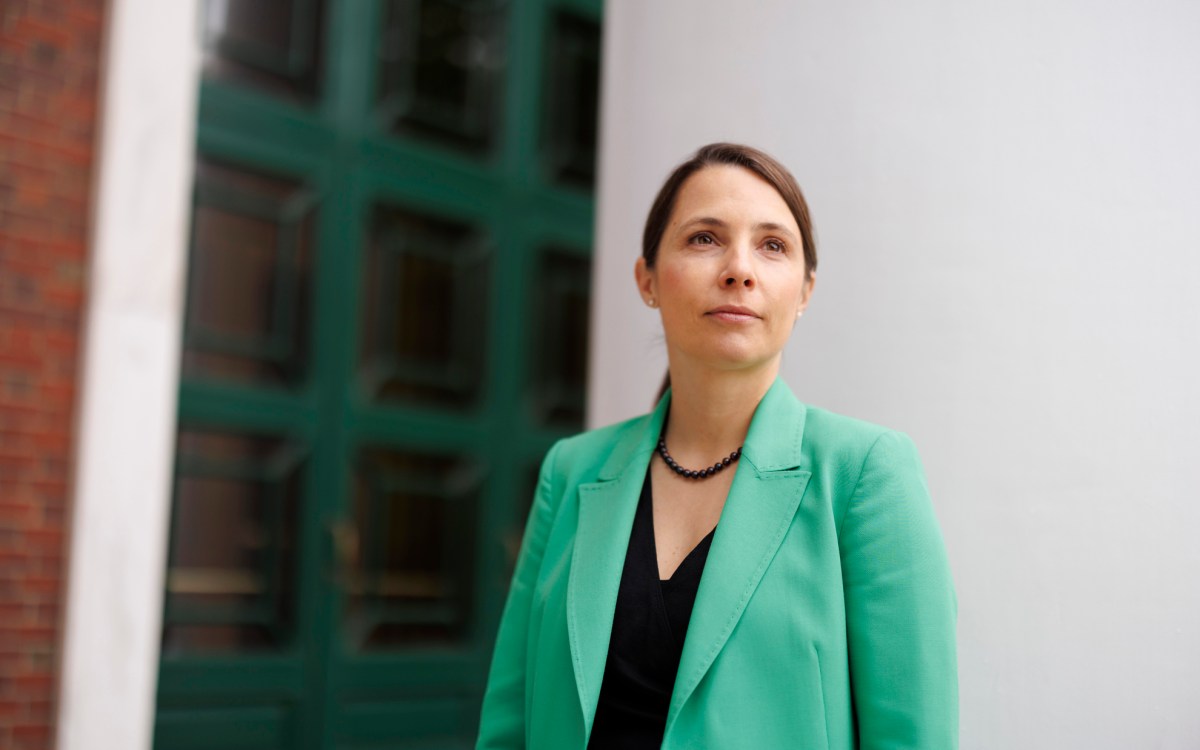
Harvard Business School Professor Mitchell Weiss discusses his new book, “We the Possibility: Harnessing Public Entrepreneurship to Solve Our Most Urgent Problems.”
Kris Snibbe/Harvard Staff Photographer
An entrepreneurial approach to ‘possibility government’
Business School professor looks at ways to encourage creativity, innovation
Many despair of government’s ability to tackle difficult issues after a year of pandemic, economic collapse, and civil unrest — and that’s in addition to such chronic problems as education, health care, and the environment. But there may be grounds for optimism, believes Mitchell Weiss, professor of management practice and the Richard L. Menschel Faculty Fellow at Harvard Business School. In a new book, “We the Possibility: Harnessing Public Entrepreneurship to Solve Our Most Urgent Problems,” Weiss argues that by embracing an entrepreneurial spirit, public agencies can bring creative solutions to even seemingly intractable challenges. The Gazette recently spoke to Weiss, a former chief of staff to the late Boston Mayor Thomas Menino, about the potential for innovation in government and how to foster it.
Q&A
Mitchell Weiss
GAZETTE: Many who have served in government leave discouraged about its potential to solve difficult problems. What makes you hopeful?
WEISS: First, it’s what I witnessed. When I was in government, I found many instances of great public servants coming together and making progress on the biggest challenges they saw. I’m not saying that we always did in Boston, but I saw that it’s possible. In addition, since I left government and since I had the chance to study episodes of public entrepreneurship all around the world, I’ve seen other public leaders also pursuing these solutions with bravery and skill. And I see in my students a rising generation of leaders committed to solving problems. I’ve already seen some go out and do just that, and I know that others are on the doorstep.
GAZETTE: You use the term “possibility government” to describe the innovative spirit you are promoting in government. How would you describe that and what does it look like?
WEISS: Possibility government is the pursuit of new programs and services by public leaders and their partners that, by virtue of their novelty, are unlikely to work. They only possibly might work. And that’s the nature of entrepreneurship — most new ventures fail but those that succeed are ultimately transformative. Possibility government stands in stark contrast to what we normally have, which is probability government — the pursuit of programs that will probably “work” but lead to middling or mediocre outcomes. They feel safe, but they’re not really because they’re not getting the job done. I think that, not in every instance but in more instances, we need to move to possibility government. We would recognize possibility if we saw governments opening themselves up to new ideas, if we saw more public leaders trying new solutions instead of old ones, if we saw the public encouraging them in that, and ultimately if we saw governments scaling up those that worked so they helped everyone.
GAZETTE: What are some examples you like to cite of successful public entrepreneurship?
WEISS: I’ve met amazing public entrepreneurs over the course of researching and writing the book and teaching my course on the subject. One is Mayor Melvin Carter from St. Paul, Minn. He gets elected to office promising to deliver on a giant equity agenda and goes about it in all sorts of new ways with lots of courage and skill. I feel energized whenever I talk to him. I feel his commitment to bringing about a new future. Another is Biobot Analytics, a company founded by Mariana Matus and Newsha Ghaeli, and their work around wastewater epidemiology, essentially turning sewage into a public health database. They’ve now been turning to sewage to help provide information during the COVID epidemic. What’s striking about these two examples — Melvin Carter on the public side, Mariana and Newsha on the private — is that when they began most people thought they wouldn’t succeed. That’s true of so much of possibility government — at the beginning it looks unlikely, and it is.
“To get more new good ideas we’re going to have to get more new bad ideas.”
GAZETTE: Don’t public agencies have real constraints to acting in an entrepreneurial way?
WEISS: There are barriers to taking risk in the public sector. However, all of that gets distilled to this encapsulation, which is that “government is risk-averse.” There are many problems with that argument. Ken Arrow, a Nobel Prize winner, and Robert Lind argued that governments in many ways should be risk-neutral. They can absorb risk. I observe that, yes, many people in government are risk-averse, but that’s not mainly because they are in government. It’s because they are people. Humans everywhere are risk-averse. Yet we still manage to pursue innovation. We should be able to do so in government. And it’s false to say in many instances that for governments to do nothing is less risky than doing something. Look no further than this pandemic to see how doing nothing in the lead-up around public health infrastructure left us vulnerable.
GAZETTE: Can those who work in government agencies be motivated to engage in creative problem-solving?
WEISS: Yes, there are a great number of people inside government at all levels at all sorts of agencies who are waiting for the invitation to share their ideas and try new things. Maybe they’ve been holding back because they haven’t been told that we as an agency, we as an administration, are open to new ideas. If we show public workers that we want your ideas, that we want you to try them, so long as you promise to learn as much as possible while wasting as few resources as possible, they will respond in spades, and they are.
GAZETTE: What role does sharing of best practices play in this? You suggest that even this approach may be too confining.
WEISS: Right, if there are solutions to the problem you’re facing, whether it’s the high cost of housing or environmental degradation, and you are not employing those solutions in your jurisdiction, you should be. But I would argue in many instances we don’t have the solution and that best practices are just the best yet, and they’re not good enough. So I think we should absolutely scale what’s working. We would help humankind. But if we just do that, it will absolutely not be enough.
GAZETTE: Where should we be looking for new ideas?
WEISS: I think we can look for ideas from the public. Innovation has often been sourced from users directly. So the people who use government are going to be full of ways of making it better. We can look for the way our users experience government, and their work-arounds, and try to respond to them. We can also look to nonexperts, to people who aren’t in government and don’t work on these issues day to day, for new ideas. Studies have shown that if you go to nonexperts and ask them for ideas on solving public needs, their ideas on average are worse than those from inside experts, but that you will get some ideas that are transformative. So we have to look to outsiders. And we can look to the crowd. There have been now many occasions of sourcing questions and finding solutions from the crowd.
GAZETTE: You also say we should welcome even bad ideas.
WEISS: There can’t be a more controversial time to suggest a more controversial idea than to say right now what we need is more bad ideas. But that is the argument I make in the book. To get more new good ideas we’re going to have to get more new bad ideas. If we’re going to open ourselves up to users, to nonexperts, to the crowd, of course much of what they suggest is going to be ultimately not usable. But if we close ourselves off to new voices, we’re also not going to get those few novel solutions we desperately need. At the same time, we don’t want to invest public time and public money amidst all these urgent crises on bad ideas. So part of the book is about how do we quickly address the uncertainties in an idea, begin to sort out the good from the bad.
GAZETTE: What are the limits to public entrepreneurship? Are some risks best avoided?
WEISS: We need in more places to move from probability toward possibility, but we don’t want to move past possibility toward delusion. Some of the novel solutions we witnessed last year in response to COVID-19 have been possibility government, and some of it has been delusion — swallowing Lysol, hydroxychloroquine. We need to be able to sort out the difference between possibility and delusion. In the book I share a list of some two dozen guardrails. For example, we shouldn’t be trying efforts where the returns mainly go to one group of people and the risks fall on another. We shouldn’t be introducing systemic risks in a system that can’t withstand them. If we have the wrong motives, that is a strong sign that what we are doing is not possibility but something more dangerous. You might have strayed from possibility toward delusion if you promise success at the outset; we need to be candid with the public and ourselves about the unlikelihood of new things succeeding — promising that all of them will succeed is going to undermine trust.
GAZETTE: How do you entice private entrepreneurs or young people who aspire to become entrepreneurs to bring their skills to government?
WEISS: Entrepreneurs want to solve problems, and that is so much of what being in public life is about, especially these days. You want to work on the most important stuff? That’s what government officials are doing all around the world. In addition, you don’t have to choose whether to go into public life forever or not. You can try it out, spend some time, learn about the complexities and nuances of government. At the end of the day, we all get the government we invent. If you don’t like what you see in your community or in your country, then help fix it.
This interview was edited for length and clarity.





